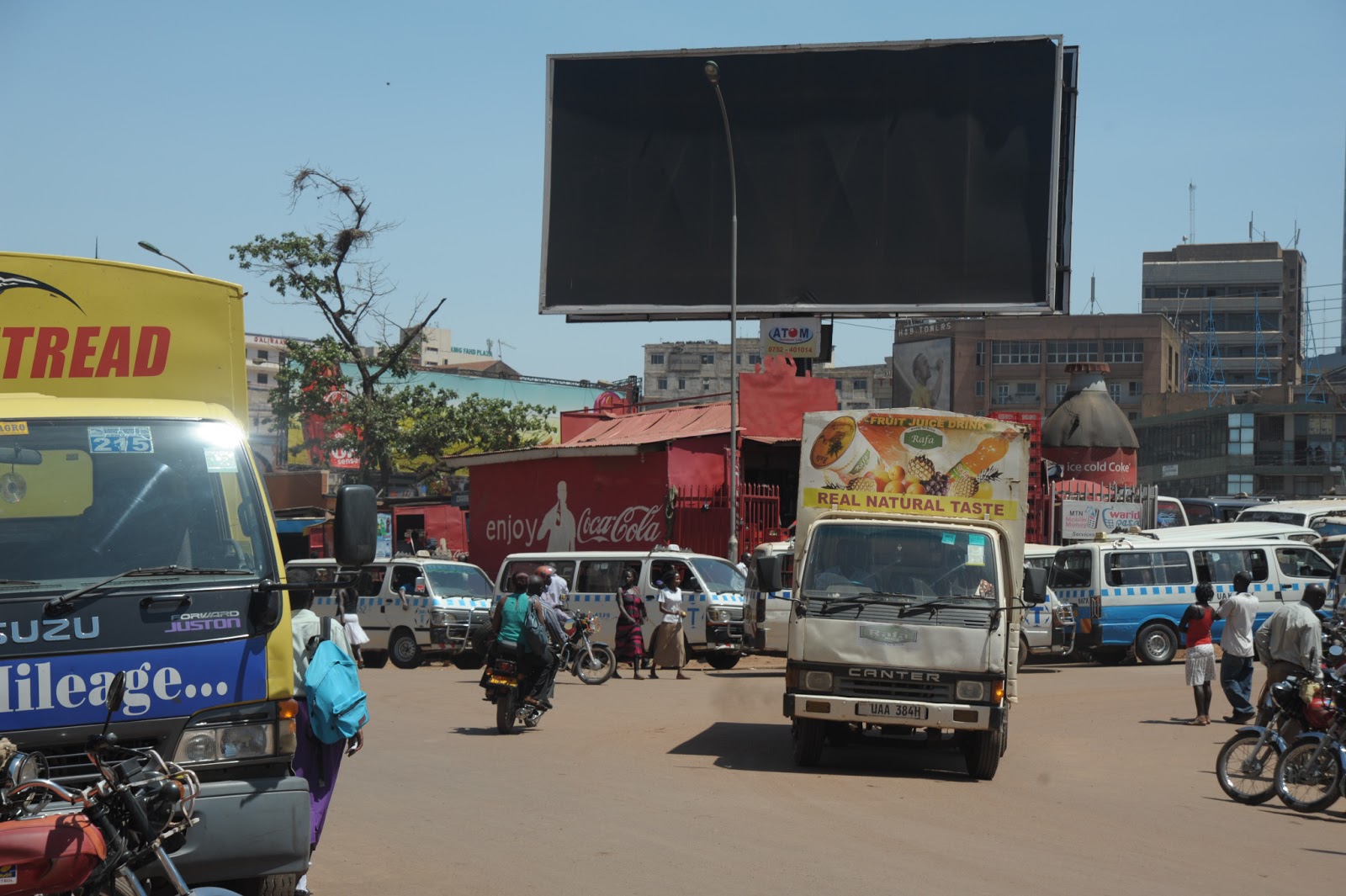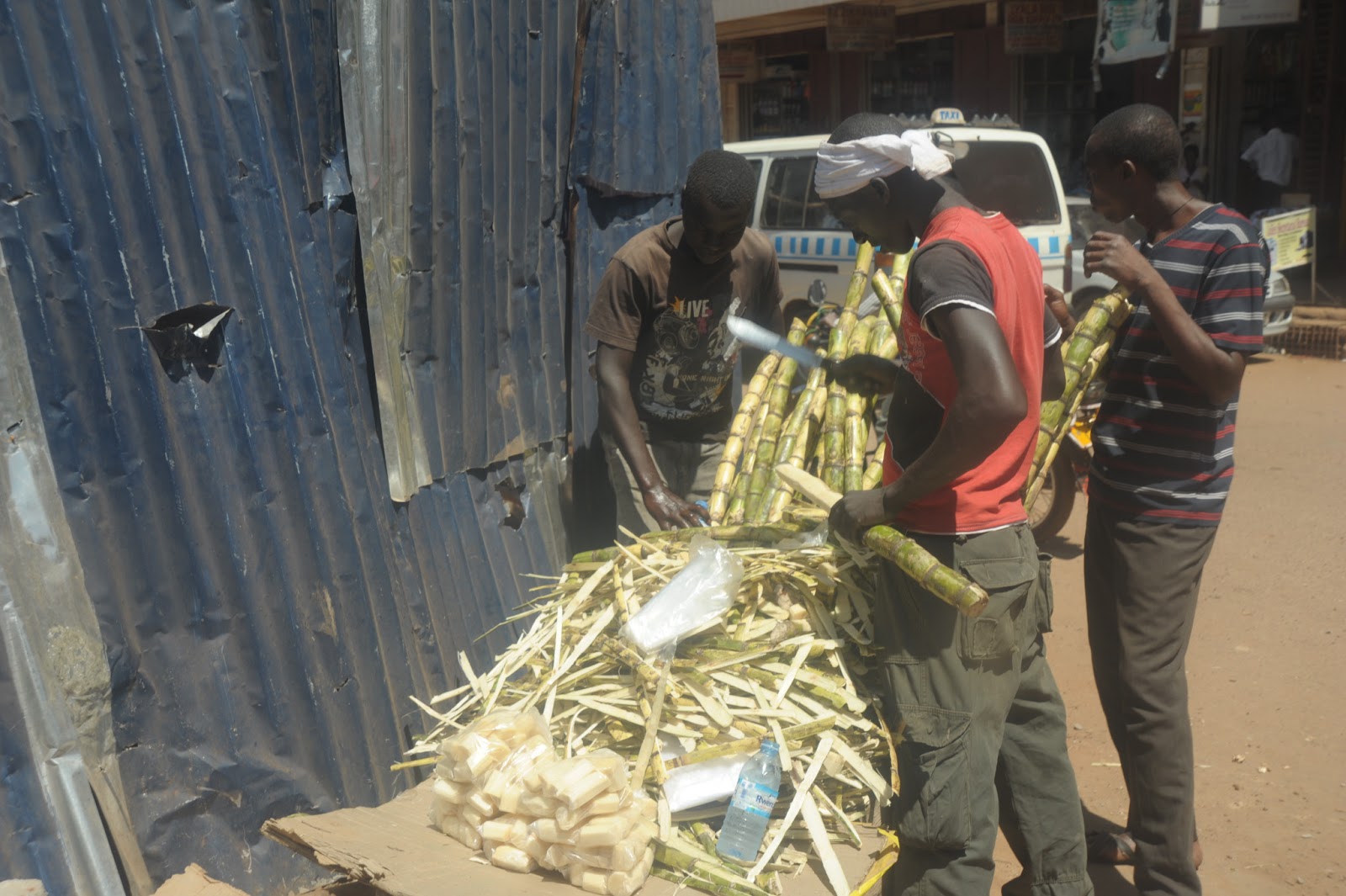After the adrenaline (caffeine?) rush of Kampala, it is a
relief when Victoria tells us she needs to go into town, and perhaps I could go
over clinic arrangements and procedures with Rose while Alicia helps out in
the little ones’ dormitory.
Pauline Greenlick, who is treasurer of the Bright Kids USA
Foundation, and her husband Louis Picard
from Pittsburgh, have been very busy networking, and she sent me
a couple of emails reporting on her progress and requesting some
information. She asked about the
possibility of screening for ocular disease in the children and whether
Victoria has plans to support those with disabilities in the surrounding
community.
The clinic is named after Gloria Namusoke, a BKU orphan who had multiple disabilities and died while away at
boarding school after making great progress under Victoria's care and love. As in many poor countries, those with
significant disabilities are often hidden away by families and not provided
with the opportunity of developing their full potential. It is hoped the clinic will eventually become
self-supportive by providing services to members of the surrounding
community. Victoria hopes to encourage
families to bring members who suffer disabilities to the clinic, by offering
free care to those individuals.
I spend time with Rose going over the clinic supplies and
questioning her rather closely about her experience in medical procedures and
treatments, and particularly the use of the various medications we procured
yesterday. I am most impressed by her
knowledge, reported experience, and overall confidence. We identify a short list of supplies we
wish to add, including eye charts and an ophthalmoscope (magnifier light for
examining eyes). I hope to accomplish
vision screening with all the kids during my stay. I have not seen any of the children with
eyeglasses, so I suspect we may detect a few vision acuity issues which may be
impeding studies and require assessment by an optometrist.
 |
| Rose at work behind her desk |
We also review the preparations for the planned
vaccination clinic this coming Saturday.
Rose has confirmed with the public health department that they will
deliver combination vaccines for measles, mumps, rubella and also diphtheria,
tetanus, polio with syringes and needles early Saturday morning.
We remind Victoria that posters still
need to be disseminated in the area, although she has been getting the word
out through her considerable local network.
 |
| Rebecca, Obama in back, Alicia, and Rose standing over Lydia |
 |
| awaiting lunch in the little ones' dorm |
 |
| Jovan - a very friendly ham of a guy |
 |
| Auntie, Rona in Rose's lap and Harriet in behind |
 |
| Lydia |
 |
| Sanyu with Alicia behind and left. I was a bit alarmed by Sanyu's distended abdomen, but Rose advises she was badly malnourished on arrival at BKU with the typical associated abdominal distention, and that she is steadily improving |
 |
| Auntie, Rose with Rona, Harriet (behind), Becca and Alicia |
 |
| Elijah Obama |
Following a short (and surprisingly calm) visit with Alicia
and her charges at the little ones’ dorm, I have lunch and a short nap. Alicia helps Richard with his various tasks
tending the animals, including milking the cow, feeding and watering the hens
& chicks, etc.
Victoria surprises us by arriving back by pickup truck laden
with a new bunk bed for the little ones’ dorm, a desk, chair, and waiting room
bench for the doctor’s office area of the clinic (just nearing completion), and
sundry needed general purpose items, all purchased with the funds I had left
over from our shopping trip yesterday.
 |
| Victoria had many of the kids pose out front of the main building with the new supplies and furniture. |
I love photography, particularly people photography, and I
hope to contribute to getting more exposure for BKU and perhaps attracting
sponsors for the children who are not yet sponsored. To this end, I spend some time “torturing” a
number of the kids (Alicia’s opinion) by getting individual portrait images. Look for them on page two of this blog (soon to come).
Pastor Wilson arrives and leads us in a prayer service. Thankfully, the power comes back on in time to
finish preparation of the evening meal and settling the kids to bed. I post my Day 3 report, arrange a Skype
date with Sarah, and show some of the kids the BKU short video which is
posted on YouTube (see the link on this home page). Unfortunately, the
internet connection is slow enough that the video needs to be coaxed along in
2-5 second bursts, with frequent re-starts.
We have a couple of our own short videos from the first day which I was
unable to post to the blog for some reason.
I will try posting them to YouTube and provide links on the blog home
page. Sarah has promised to help me tidy
up the visual appearance of the blog when she gets some spare moments, since
she is now busily studying graphic design in Vancouver.
 |
| The little ones await the start of the prayer meeting |
 |
| Alicia has Obama glued to her lap |
Nights:
Since it’s 4 am, I’ve started adding to this post, and this
all is becoming a too-common theme, I thought I may as well comment on the
nights at BKU.
Nights are mainly very quiet and there are only a few
outdoor lights left on around the compound.
The three dogs who belong to BKU tend to lounge on the front porch,
which is just outside the windows of Alicia & my rooms. When I’m lying awake, the sound of a dog
breathing or scratching makes me wonder if it’s in the room with me. Three or 4
times nightly, something sets off a loud chorus of mournful wailing and excited
barking which persists for 15 to 60 seconds.
Typically, I’ve been sleeping soundly from 1030 pm to 2 am,
then up until about 5 or 6 (usually after the first or second rooster crowing),
then I will sleep again until perhaps 8.
Alicia does much better sleeping the night through. It seems a bit long for jetlag to persist –
wonder if it’s the antimalarial med, the
heat, the huge turmoil of emotions I’m sorting through each day, or a
combination of all the above. You, dear
reader, are the lucky (or not) beneficiary for, with a full day and a straight
8 hours’ sleep, there would not be much time for blogging. Sometimes I do get a half hour nap midday,
but usually can’t sleep then either.
So, when I get bored of the thoughts and ideas churning
around my brain, I get up, grab the laptop and go out to the dining table to
set up and worry about my exposure to mosquitos. Usually I apply a little more DEET spray for
good measure.
The first night of this, I was alarmed by scrabbling and
scratching in the kitchen. Finally
investigating with my flashlight, I saw a rat was the source of the commotion
(smaller than Alicia’s pet rats from a former time). One night it was very active, even pushing
pots and pans out of the cupboard, but usually it’s just scurrying about. I was at first a bit alarmed, but we now co-exist quite comfortably.
Alicia – the girl who at 5 was famous for handling bugs and
snakes – freaked out one evening when she caught a glimpse of the rat in the
storeroom off the kitchen, and she had several of the older boys hunting about
but stealing looks at her as if to say “what’s all the darned fuss about?” She’s seen 2 cockroaches since we’ve been
here, both mildly large & relatively docile. She does get over it quite quickly, and is
even becoming more comfortable around the cow.
Victoria says she’s occasionally needed to spray for bugs or put out rat
poison, but she naturally hesitates to overdo it with little ones crawling
about, and the building quite unavoidably has cracks and crevices in the walls.
It’s a bit funny what things do or do not scare people. Arnold, the incorrigible ham who’s traversing
the terrible twos will drive Alicia nuts by tormenting the dogs or cows with a
stick, stomping on the dogs’ tails or jamming his hand in their mouths, yet
when I walked around front with him this evening to look for his shoes just
after dusk, he was terrified when we saw a small frog hopping about.
 |
| Arnold in a rare quiet moment |
Personally, I'm very leery of snakes in the wild and thankful we have not yet encountered any in Uganda.
Some random unrelated pics follow below.
 |
| Dan is thrilled to be given a homework assignment |
 |
| Rebecca, Sandra & Dan back home from school |
 |
| Robert is sponsored by a Canadian lady |
 |
| Rebecca & Sandra |
 |
| Janat & Brenda check in with "Mama" on arrival back from school |
 |
| Preparing the evening meal in the kitchen. The blue box in back is the Biosand water purification device |
 |
| Ester holding Don, the youngest BKU charge at 10 mos age |
 |
| Hakim (Victoria's grandson) with Brenda |
 |
| Robert |
 |
| A precious cargo for the boda boda captain enroute to school |
 |
| Rose visits a stand in Kampala |
 |
| Kampala residents at rest |



































































